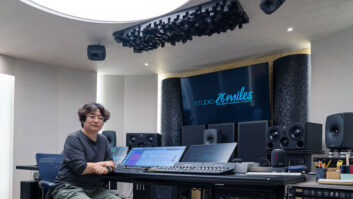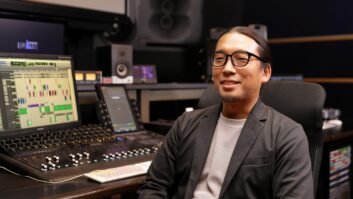
Music Xray co-founder Mike McCready
While we continue to grimace at the headlines that insist the music industry is in the ICU and cringe at predictions that those involved will endure devastation of apocalyptic proportions, there are a few glimmers of hope. It seems that, in spite of shrinking budgets and vanishing jobs, the demand for music for TV, film and artist-centered projects is actually increasing. The question is, how are decision-makers at the networks, major film companies and record companies finding new talent and making their selections? As it turns out, our old nemesis (the Internet) may not be such a bad guy after all, at least when it comes to music-placement opportunities. In fact, it just may wind up becoming the hero.
This month, we spotlight two companies that have enjoyed success as a result of the Internet and are subsequently helping to invigorate the industry. Not only are these companies playing a role in helping musicians find legitimate avenues for placing and earning income from their music, but they are also helping decision-makers make more effective use of the time they spend in their search for suitable material for their projects.
21ST CENTURY A&R
”Plain and simply, we wouldn’t be able to function without the Internet,” says David Trotter, co-founder, senior producer and creative director of Studio 51 Music. With 5,000 titles that represent 200 sub-genres, approximately 15,000 needledrops on TV heard by 140 million people worldwide each year, and a family of 112 composers who collectively average 60 to 70 cues per week for network TV and major film projects, Trotter says that the Internet has been absolutely vital in his company’s success. Not only does the Web enable the company to meet extremely fast turnaround requirements, but it also identifies the highest-quality music to satisfy the most critical demands.
“We’ve had occasions in which we’ve had four days to produce 125 titles,” says Trotter. “The Internet has given us profound advantages. I can review MP3 demos as soon as they come in from composers, decide if they’re ready or right, and then either immediately have a composer address any edits or upload broadcast-quality files to our FTP.” Trotter adds it would be logistically impossible to do this as efficiently and effectively without the use of high-speed Internet connection.
In addition to tapping into the talents of his team of composers, Trotter often uses an Internet-based A&R company on which he can list information about his specific project needs. The company then assists with the selection process, collecting and reviewing submissions, and then forwarding to him the ones they believe are most fitting for each project.
This Internet-based A&R approach provides the foundation for one of the fastest-growing online machines: Music Xray. The company, which was launched just a year ago at MIDEM with 12 music industry professionals as subscribers, now enjoys 1,100 music pros and 200,000 music-maker customers. Music Xray takes the selection process a few steps beyond listing opportunities. Through cutting-edge technologies, the company strives to generate greater efficiency in the A&R process.
“Oftentimes, music projects that are released by the industry are not profitable, as the wins wind up paying for the failures,” says Music Xray co-founder Mike McCready. “Given the turmoil that is going on, we recognized the need for efficiency and accuracy to help industry pros make better decisions that will ultimately reduce the risks they are taking and lead to bigger profits.”
Here’s how it works: Anyone who conducts A&R— from indie to major labels to Internet radio, from managers looking for new artists to music publishers, and from influential music bloggers to any professional who receives and evaluates music for some sort of exposure or commercial opportunity—can set up a profile and open a “drop box” to make submission opportunities available. Then, any one of the estimated 14 million musicians who are online can submit their material to descriptions they feel closely match the music they have created.
“For music industry professionals, finding needles in the haystack—aka, music on the Internet that has been generated by independent artists—is an extremely inefficient process. And for musicians, it’s much the same,”says McCready, who adds that if musicians expect to slap up a MySpace page and get discovered, they are engaging in overly optimistic thinking that rarely pays off.
David Trotter, co-founder, senior producer and creative director of Studio 51 Music
A SCIENTIFIC APPROACH TO MUSIC SELECTION
Drop boxes are only part of the equation. The company also offers a suite of technology-based tools that help people with professional ears separate the good from the bad. The first tool is the music-matching technology, which essentially analyzes a song’s acoustic qualities and then generates e-mails to every song owner whose songs have met the given criteria.
Let’s say a music supervisor wants to find a song that is similar to “Brown Sugar” by the Rolling Stones. “To improve his chances of finding a song that is in this vein, we offer a piece of technology that analyzes the song’s acoustic qualities and the system fires out an e-mail to all song owners whose songs meet these requirements,” explains McCready. “The benefit, of course, is that it saves industry professionals time because they are listening to songs that have some properties of the song they indicated, and this increases the percentages of finding a match.” McCready says the idea behind Music Xray was that it would function much like a medical X-ray: “X-rays don’t do the job of healing broken bones, but they do provide better information [or in the case of music, data points] to help professionals make effective decisions”
In addition to music-matching technology, a second tool the company offers provides industry professionals a platform to review pertinent information about songs or artists by offering them access to the site’s back end. “Music pros who sign up for Music Xray can go in and look at various statistics on songs, such as how many times they’ve been submitted, how other pros have rated given them and review the top-rated songs,” says McCready. “This is like crowd-sourcing, but it’s controlled since it’s done with industry pros who make a living critiquing music.”
A third tool provides both sides the ability to conduct a focus group on a song. Songs can be sent out to a group of music fans, who get compensated to provide their input. Information on individual focus group members—such as income level, how much they spend on concerts and recorded music, and geographic location—is attained, thus providing invaluable information that can help pinpoint important information about audiences and how they respond to individual songs. Combined, the services can help to reduce risk for industry professionals and help them make wiser decisions about projects they take on.
While these tools have been valuable, the technology behind them hasn’t been an easy sell for the company. “I think of the music industry is just in front of the Amish in the race to adopt new technology,” McCready says jokingly. Fortunately, after spending two years in research and development and one year in beta, the technology offered through Music Xray is finally gelling and beginning to make a difference.
HEIGHTENED INDUSTRY STANDARDS
Still, many composers and musicians would argue that the technology and submission opportunity services still haven’t helped them land any deals. According to Trotter, there is a simple reason why: Decent no longer cuts it. Period. You’ve got to be able to generate material that is excellent and stands out from the crowd.
“If you’re a great writer with solid, quality music, and you conduct yourself in a professional manner, there is plenty of room in the industry for you,” he says. “There is a lot of debate out there on this, but in my world, the reason why it’s difficult for composers to make it is not because the industry has closed its doors to newcomers; it’s because the quality of submissions has gone down while the quality of acceptance requirements has gone up.”
That’s never been more true than it is today. At the networks and major film companies, standards are extremely high, and composers will have to know their stuff to make it into the inner circle. “If we have a client who needs a mariachi piece and I receive a submission in which I can tell that the trumpet is MIDI, it’s going to get declined,” says Trotter. “At Studio 51, we are dealing with the highest-end clients, so if a piece of music comes in and it’s not up to the quality standards, it’s not going to be selected by us. It doesn’t necessarily mean that it won’t be picked up by another library, but it won’t be included in ours.”
In fact, McCready says that more stringent requirements is one of the chief reasons Music Xray imposes submission fees. “Artists may complain about the fees involved in submitting material, but the reality is, if it were completely free, providers would be inundated with material,” he explains. “Having a fee ensures that musicians aren’t submitting every song they’ve ever created, but, instead, focus on submitting their best material that more closely meets what a listing is requesting.”
And in spite of popular belief that portrays decision-makers sitting around with disturbingly menacing expressions, eagerly awaiting opportunities to trash the music they receive, Trotter says the reality couldn’t be further from the truth. “A lot of writers think we like to say ‘no,’ but the truth is, we would much prefer to say ‘yes,’” he says. “Not only do I not want to waste my time listening to a piece of music that is way off the mark, but I genuinely want musicians to succeed.”
To help song owners enjoy a higher success rate, Music Xray offers several services that help them perfect their skills, from professional song critiques to career coaching. Trotter has a simple piece of advice: “Up your quality and your standards, create excellent music, and you could write for the major markets.”
Tips for Success
Do you wan to write for the major markets? Here are a few tips for
success?
Be professional. If you’re one of those people who tends to make a lot of noise on music-related public forums, you may want to consider toning it down a notch or two. Decision-makers, like Trotter, often read these forums and will take note of those who don’t present themselves in a professional manner. “I mark a guy by his professionalism, and I do keep a little list,” he warns. Beyond professional tone, Trotter also looks for professional affiliations and volume of work. “I always investigate a composer to make sure that he or she is an ASCAP or BMI member, and I look at the amount of material he or she has registered. This industry is a numbers game, so a composer who has 400 songs listed has a much better shot at catching my eye than one who has four.”
Play to your strengths. If your forte is writing hip hop, then write hip hop. If it’s pop, write pop. “If you’re a hip hop writer and you want to try to write metal, don’t try to present yourself as a metal writer off the bat because there are writers out there who know that genre and are going to crush you,” says Trotter. “Play to your strengths, especially when trying to break in, and then branch out into other genres if you want to after you’re established.”
Generate quality. A few simple tips on this one: Don’t use loops. (“Are you a composer or a DJ?” asks Trotter.) Keep your sounds up to date. If what you create sounds dated or if it sounds like MIDI, it won’t cut it for the major markets. Don’t submit something if it’s not ready. Decision-makers keep notes of composers who submit too much material that is off the mark and will simply stop listening to submissions from those who have made it onto “the list.”
Know music theory. Trotter always analyzes a piece of music to determine if the composer understands theory. In addition, he listens for counter melodies. If you want to submit to major TV or film projects, be sure to include counterpoint in your material.
Study your intended market. “I can’t tell you how many times I’ve heard composers say they’d like to write for film and TV, but when I ask what their favorite shows are, they say, ‘Oh, I don’t watch TV,'” says Trotter. “If you want to write for TV, you’ve got to know what the industry is looking for.” To that end, he suggests placing a towel over the TV so you don’t get caught up in the drama on the screen and analyze the different styles of music being used.
Be your own worst critic. “Don’t go to the mutual admiration society to get feedback for your music,” cautions Trotter. Instead, it’s important that you find people you trust and who have experienced some success. Also, judge yourself with honest, critical ears. “Don’t go into it thinking that what you’ve created is going to change the soundscape of the universe. Be critical, be willing to make the changes necessary, and you’ll set yourself up much better for success.”
Studio Unknown is full-service audio post-production facility and recording studio that specializes in helping clients discover creative sound for film, video, Web, gaming and artist projects.







